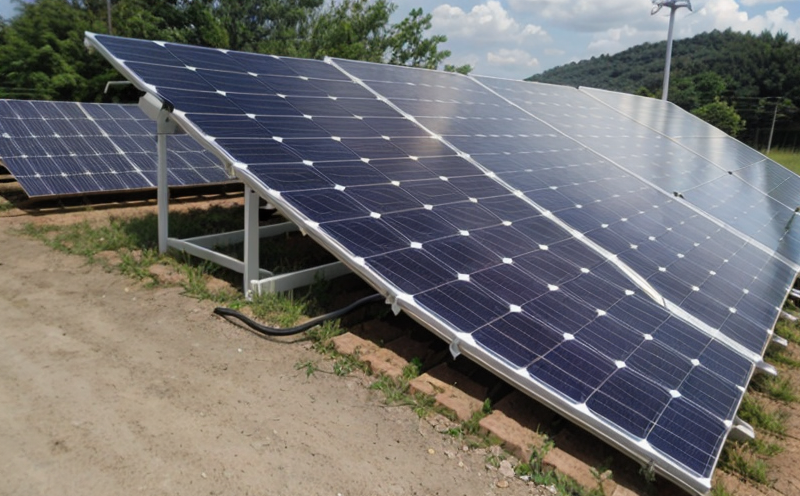UL 746C Polymeric Material Weatherability Testing
The UL 746C standard is a critical benchmark in the solar energy sector, ensuring that polymeric materials used in photovoltaic (PV) modules and related components can withstand environmental stresses over their expected lifetime. This test evaluates the durability of these materials under exposure to ultraviolet (UV) light, heat, humidity, and other weathering conditions.
The purpose of this testing is to ensure that PV module manufacturers produce products that are reliable and safe for use in a wide range of environmental conditions. The standard is particularly important because it helps prevent degradation of materials over time, which could lead to reduced performance or failure of the photovoltaic system.
During the UL 746C test, samples undergo accelerated aging to simulate real-world weathering effects. This process involves exposing polymeric materials to high-intensity UV light and heat, often in a combination with humidity cycling. The goal is to replicate exposure that would typically occur over several years of outdoor use.
The test parameters are meticulously defined by UL standards. Samples are subjected to specific temperature cycles, humidity conditions, and UV radiation levels designed to accelerate the aging process without causing artificial damage. This allows manufacturers to assess how well their materials will perform under prolonged exposure to natural elements.
After testing, the samples are visually inspected for any signs of degradation such as discoloration, cracking, or loss of flexibility. Mechanical properties like tensile strength and elongation at break may also be tested post-exposure. Compliance with UL 746C ensures that the polymeric materials used in PV modules meet the highest quality standards, enhancing system reliability and performance.
Understanding the importance of this test is crucial for manufacturers who want to ensure their products are durable and safe. The testing process not only protects the integrity of the product but also builds trust with consumers by demonstrating adherence to stringent industry standards.
Why It Matters
The durability and longevity of materials in PV modules directly impact the overall performance and lifespan of photovoltaic systems. Exposure to environmental factors such as UV radiation, heat, cold, humidity, and moisture can lead to significant degradation over time, affecting the efficiency and reliability of the module.
UL 746C testing is particularly important for ensuring that polymeric materials used in these modules are robust enough to withstand these environmental stresses. By subjecting materials to accelerated aging conditions, this test helps identify potential weaknesses or areas where improvements can be made before products reach market. This not only protects the manufacturer's reputation but also ensures consumer safety and satisfaction.
Adhering to UL standards is essential for manufacturers aiming to meet regulatory requirements and gain a competitive edge in the solar energy sector. It demonstrates commitment to quality and reliability, which are critical factors influencing customer trust and adoption of new technologies.
Why Choose This Test
The UL 746C test is a pivotal step in the development and certification process for polymeric materials used in PV modules. By choosing this test, manufacturers ensure that their products are rigorously evaluated against stringent industry standards. This not only enhances product quality but also supports compliance with regulatory requirements.
The accelerated aging conditions replicate real-world environmental stresses, providing valuable insights into the material's long-term performance and durability. This information is crucial for optimizing materials and processes to enhance module reliability and efficiency. Additionally, passing this test can significantly boost a manufacturer’s reputation, making it easier to gain market acceptance and trust.
Moreover, UL 746C testing aligns with broader industry trends towards sustainable practices and high performance in renewable energy technologies. By adhering to such stringent standards, manufacturers contribute to the advancement of solar technology, ensuring that systems are reliable and effective for years to come.
Use Cases and Application Examples
The UL 746C test is widely used in the photovoltaic industry to evaluate polymeric materials intended for use in module frames, encapsulants, and other components. This ensures that these materials can withstand harsh environmental conditions without compromising performance or safety.
For example, during the development of a new PV module frame, manufacturers may subject samples to UL 746C testing to assess their resistance to UV radiation, heat cycling, and humidity. The test results help in identifying any potential issues early on, allowing for necessary adjustments before full-scale production.
Encapsulants are another key area where this testing is critical. These materials are responsible for protecting the photovoltaic cells within the module from environmental damage. By subjecting encapsulant samples to UL 746C conditions, manufacturers can ensure that these materials remain intact and effective over time.
The test also plays a role in the certification process of new polymeric materials. Regulatory bodies often require compliance with UL standards as part of the certification criteria for PV products. This ensures that only high-quality, reliable materials are used in solar energy systems, enhancing overall system performance and safety.





